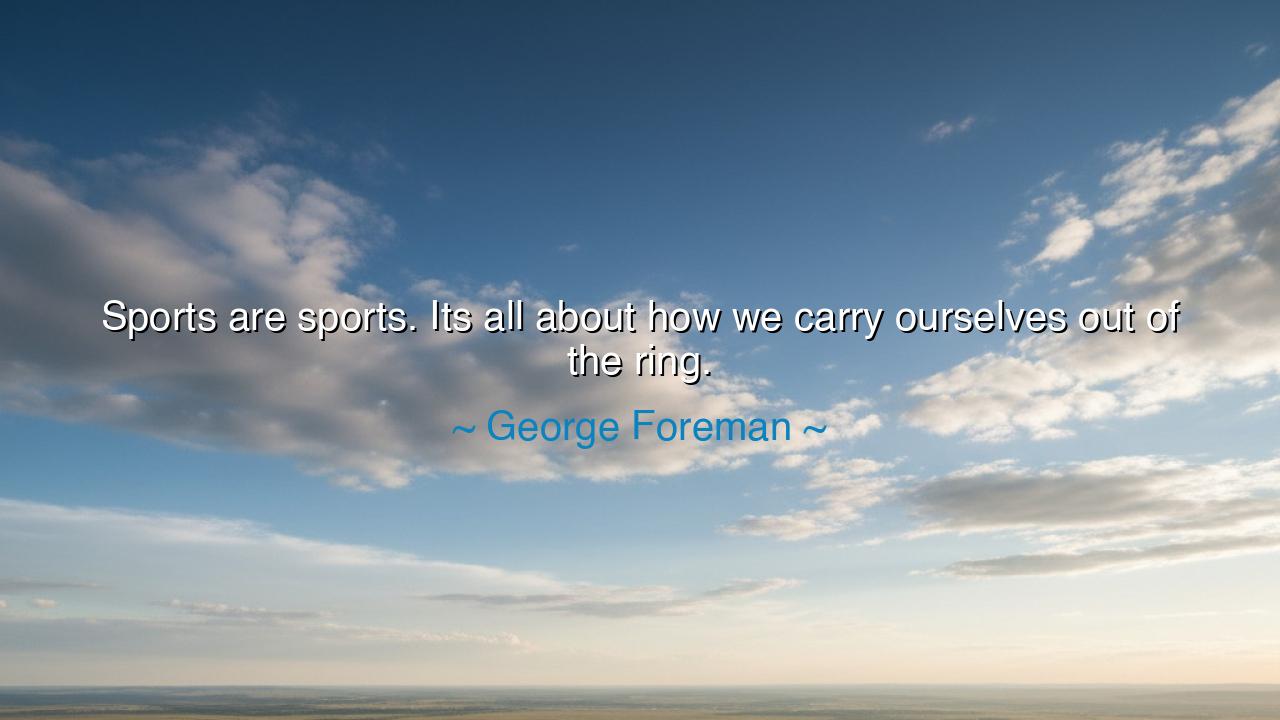
Sports are sports. Its all about how we carry ourselves out of






George Foreman, the mighty warrior of the ring, once said with the gravity of experience: “Sports are sports. It’s all about how we carry ourselves out of the ring.” These words, though spoken in the language of a fighter, hold meaning for all humanity. They remind us that the clash of bodies, the striving for victory, the test of strength—all these belong to the game. But beyond the game lies the greater trial: the measure of our character when the contest is finished, when the crowd is gone, and when we stand as men and women among others.
The heart of this saying lies in the difference between performance and character. In the heat of the match, anything may happen—fury, struggle, even violence. But these are bound by the rules of sport. What reveals the true nature of a person is not what they do in the ring, on the field, or on the court, but how they walk away from it. Do they leave with humility, respecting friend and foe alike? Or do they leave with arrogance, dishonoring the lessons of competition? Foreman, who knew both the triumph of victory and the sting of defeat, spoke as one who understood that the legacy of an athlete is written not in punches thrown, but in dignity carried.
We see this lesson in Foreman’s own life. As a young man, he was fierce, feared, and sometimes consumed by anger. His fight against Muhammad Ali in Zaire, the legendary “Rumble in the Jungle,” ended in a crushing defeat that humbled him. Many believed his story was over. Yet years later, he returned, not only to win back the heavyweight crown at an age when most fighters had retired, but also to show a different spirit—gentle, humorous, even fatherly. Out of the ring, he became a preacher, a mentor, and even an entrepreneur, remembered as much for his kindness as for his strength. Truly, he lived his own words: sports are sports, but life is greater than sport.
History, too, offers echoes of this truth. The gladiators of Rome fought with ferocity before the crowds, but those remembered with honor were not merely the strongest—they were those who bore themselves with courage and grace, whether in life or in death. Likewise, in the ancient Olympic Games, the Greeks honored not only the victors but also those who showed arete—excellence of spirit—in how they accepted loss. For the contest was seen as a reflection of virtue, but the greater test came afterward, in the conduct of daily life.
The wisdom of Foreman’s words teaches us that sport is a mirror of life, but not the whole of it. What we do in the ring is fleeting, witnessed in an hour or a moment. But how we conduct ourselves when the moment has passed—that is the lasting testimony. To cheat in life, to boast, to carry bitterness—these destroy the honor of even the greatest victories. But to live with humility, gratitude, and respect is to turn even defeat into triumph.
The lesson for us is plain: pursue your contests with vigor, but let them never consume your humanity. Play hard, fight hard, strive for excellence—but when the game is done, treat your fellow man with dignity. Let your victories make you humble, and let your defeats make you wise. Remember always that the measure of your greatness lies not in what the crowd sees when you compete, but in what the world sees when you live.
So I say to you: heed George Foreman’s wisdom. Whatever your arena—whether ring, field, or office—remember that sports are sports: fleeting, passionate, yet passing. What endures is how you step beyond the boundaries of competition, how you carry yourself in the quiet moments of life. For in the end, the true champion is not the one who conquers others in the game, but the one who conquers pride, anger, and selfishness in the greater contest of living.






AAdministratorAdministrator
Welcome, honored guests. Please leave a comment, we will respond soon